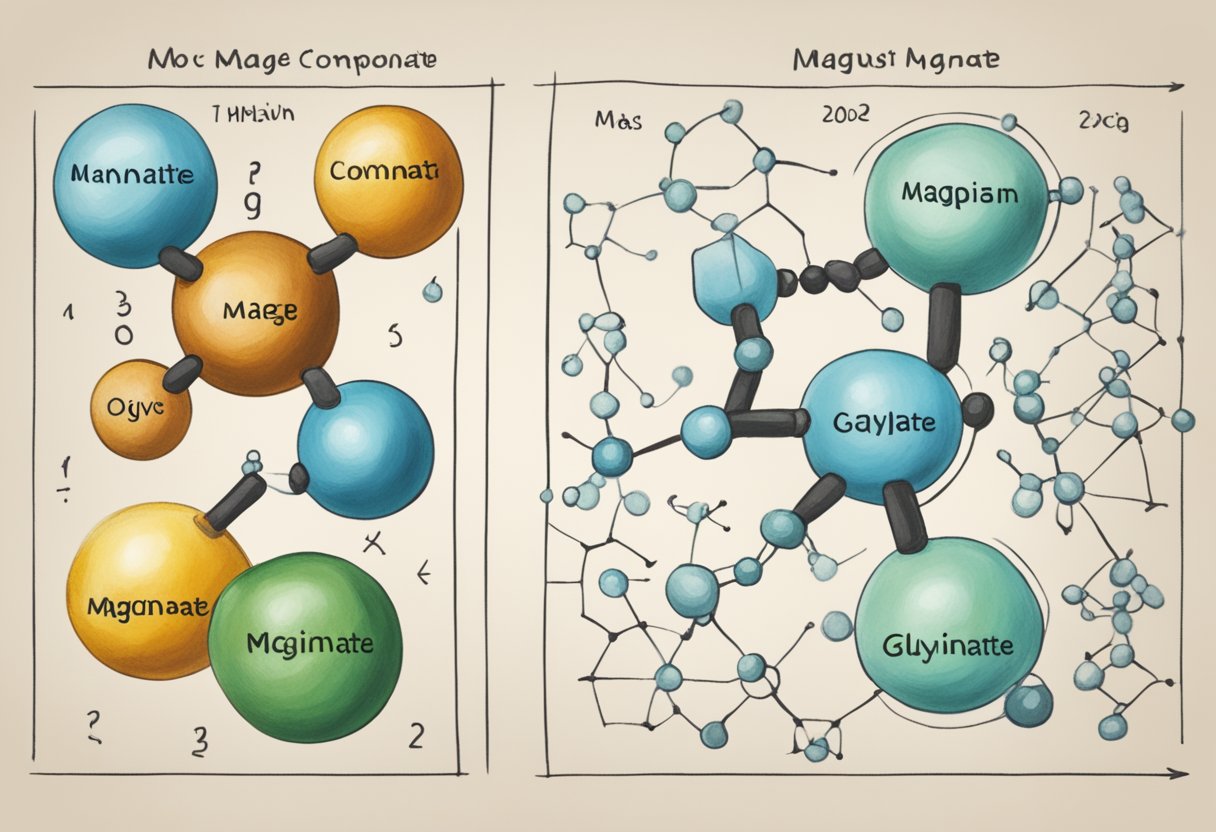Magnesium is an essential mineral involved in numerous bodily processes, including nerve function, blood pressure regulation, and bone health.
Within the realm of dietary supplements, magnesium oxide and magnesium glycinate are two forms that stand out for their distinct characteristics and uses.
Magnesium oxide is an inorganic compound known for its high magnesium content by weight, making it a common choice for addressing magnesium deficiencies.
Conversely, magnesium glycinate, a chelated form of magnesium bound to the amino acid glycine, is recognised for its potentially greater bioavailability and gentler effects on the gastrointestinal tract.

The comparison between magnesium oxide and magnesium glycinate often revolves around their absorption rates and tolerability.
Research suggests that organic forms of magnesium, such as magnesium glycinate, are absorbed more effectively than inorganic forms like magnesium oxide.
The improved absorption of magnesium glycinate may translate to better outcomes for individuals who require magnesium supplementation.
However, the specific needs of individuals vary, and some may find that the higher elemental magnesium content in magnesium oxide is more suitable for their nutritional goals, despite its comparative absorption inefficiency.
Choosing the right form of magnesium supplement can be crucial to achieving the desired therapeutic effects without unwanted side effects.
Magnesium glycinate is often the preferred option for those who may be prone to digestive issues or who require a form that has minimal impact on stool consistency.
In contrast, the cost-effectiveness, and the amount of elemental magnesium per dose, make magnesium oxide a viable option, especially for those on a tight budget or with higher magnesium requirements.
The decision between these two forms should be made with consideration of individual health needs and lifestyle factors, possibly under the guidance of a healthcare professional.
Magnesium Fundamentals
Magnesium is a crucial essential mineral and the fourth most abundant mineral in the human body, playing a pivotal role in numerous physiological functions.
It is available in various forms, with magnesium oxide and magnesium glycinate being notable for their specific uses and absorption profiles.
Role of Magnesium in the Body
Magnesium is vital for many biological processes. It is a key player in over 300 enzymatic reactions that regulate diverse bodily functions, including muscle and nerve function, blood glucose control, and blood pressure regulation.
Magnesium also contributes to the structural development of bone and is necessary for the synthesis of DNA, RNA, and the antioxidant glutathione.
Different Types of Magnesium
There are several types of magnesium supplements available, each differing in absorption rates and specific health benefits:
-
Magnesium oxide: Often used as a remedy for acid reflux and as a laxative. It contains a high amount of elemental magnesium but is less bioavailable, meaning the body finds it more difficult to absorb.
-
Magnesium glycinate: Known for its potential benefits on sleep and stress due to its calming properties. Magnesium glycinate is typically more easily absorbed and tolerated by the gastrointestinal tract, making it a preferable option for long-term supplementation.
These different types of magnesium cater to individual needs and are selected based on their bioavailability, tolerability, and targeted health outcomes.
Comparing Magnesium Oxide and Magnesium Glycinate

In the quest to choose the right magnesium supplement, understanding the differences between magnesium oxide and magnesium glycinate is critical. This section elucidates their chemical properties, their bioavailability and absorption rates, and the specific health benefits they target.
Chemical Properties
Magnesium oxide is an inorganic compound that contains magnesium and oxygen. This form is characterised by a high percentage of elemental magnesium but is recognised for its poor solubility in water.
On the other hand, magnesium glycinate is an organic compound, a chelated form of magnesium that is bonded to the amino acid glycine, which inherently improves its solubility and hence its potential for absorption in the human body.
Bioavailability and Absorption
The bioavailability of magnesium supplements is a key factor in their efficacy.
Magnesium glycinate is noted for its high bioavailability, partly due to the presence of the amino acid glycine, which facilitates its absorption in the intestinal tract.
Contrarily, magnesium oxide is not as bioavailable; its low solubility hinders its absorption, with some studies suggesting that only a small fraction of its magnesium content is actually absorbed by the body.
- Magnesium Oxide: Low absorption rate
- Magnesium Glycinate: High absorption rate
Targeted Health Benefits
Each magnesium compound may benefit consumers with different health considerations.
Magnesium oxide is often used as an antacid and laxative due to the body's limited ability to absorb it, providing relief for stomach acid and constipation issues.
Magnesium glycinate, being highly bioavailable, is beneficial for those seeking to rectify magnesium deficiency with fewer intestinal side effects, and it is also recommended for its calming effects on the brain and contribution to good quality sleep.
Health Benefits and Uses

Magnesium is an essential mineral for the human body, playing a crucial role in numerous physiological functions. Here we discuss the specific benefits and uses of two common forms of magnesium supplements: magnesium oxide and magnesium glycinate.
Bone Health and Muscle Function
Magnesium oxide is known for its high elemental magnesium content, which is beneficial for bone health.
Adequate magnesium levels are important for bone density and overall skeletal structure.
Magnesium glycinate, on the other hand, is recognised for its superior absorption rates, directly supporting muscle function, including muscle relaxation and the prevention of cramps.
Cardiovascular and Blood Pressure Benefits
The supplementation of magnesium, especially in the form of magnesium glycinate, can be supportive of cardiovascular health.
It assists in the maintenance of normal blood pressure regulation and has been linked to healthier cardiac function.
Magnesium for Stress and Sleep Quality
Both forms of magnesium contribute to neural function and can help mitigate the effects of stress on the body.
However, magnesium glycinate is often preferred for its ability to improve sleep quality due to its calming properties on the brain and muscles, promoting better sleep patterns.
Potential Side Effects and Precautions

When comparing magnesium oxide with magnesium glycinate, it is crucial to consider their potential side effects and necessary precautions.
Gastrointestinal Effects
Magnesium Oxide: Often associated with more pronounced gastrointestinal reactions, magnesium oxide may lead to symptoms such as diarrhoea and abdominal cramping.
Due to its lower bioavailability, larger doses are sometimes consumed, increasing the likelihood of digestive upset.
Magnesium Glycinate: This form is generally better tolerated by the gastrointestinal system.
Magnesium glycinate is less likely to cause diarrhoea, as it is absorbed more effectively, reducing the quantity needed for therapeutic effects.
Risks and Interactions with Other Minerals
Interactions with Calcium, Iron, and Zinc: Magnesium can bind with other minerals like calcium, iron, and zinc, possibly affecting their absorption rates.
Care should be taken when supplementing magnesium alongside these minerals to avoid potential imbalances.
- Calcium: Magnesium may compete with calcium for absorption, which can be particularly concerning for individuals at risk of osteoporosis.
- Iron: Co-supplementation of magnesium can potentially interfere with iron absorption, impacting those with low iron stores or anaemia.
- Zinc: High doses of magnesium might also affect zinc absorption, an essential trace mineral involved in immune function.
Dosage and Consumption
When considering magnesium supplements, it's critical to understand the proper dosage and dietary sources.
Both magnesium oxide and magnesium glycinate have distinct absorption rates, impacting their ideal dosages.
Recommended Intake
The recommended daily allowance (RDA) of magnesium varies by age and sex, yet generally, adults may require 300-400 mg per day.
Magnesium oxide tends to have a lower absorption rate, which often necessitates a higher dosage compared to magnesium glycinate, which is more readily absorbed.
Precise dosage should be tailored to individual needs and it's advised to consult with a healthcare provider before supplementation.
Sources of Magnesium
Dietary sources of magnesium are diverse, with magnesium glycinate typically found in supplemental form.
However, one can increase their intake through various foods.
Rich sources include:
- Green leafy vegetables like spinach, which provide a significant amount of magnesium.
- Nuts and seeds such as almonds, cashews, and pumpkin seeds are excellent for snacking and magnesium intake.
- Legumes, with black beans being a particularly good option.
- Whole grains, which are not only good for digestion but are also a solid source of magnesium.
- Dark chocolate is not just a treat; it also offers a notable magnesium boost.
Incorporating these foods into one's diet can enhance overall magnesium levels without the immediate need for supplements.
Conclusion
Magnesium supplements come in various forms, notably magnesium oxide and magnesium glycinate.
Magnesium oxide is lauded for its high magnesium content but is often criticised for its lower bioavailability.
Individuals seeking magnesium supplementation for general health purposes may require a form with higher absorption rates.
Conversely, magnesium glycinate is recognised for its superior bioavailability and is associated with fewer side effects, such as diarrhoea, which can be common in other forms of magnesium supplements.
Magnesium glycinate has a relaxation effect on the intestinal motility, which might be beneficial for those with digestive issues. This form combines magnesium with the amino acid glycine, potentially exerting a calming effect on the body.
When selecting a magnesium supplement, it's important to consider the specific health goals, any existing health conditions, dietary habits, and potential interactions with medications.
Consulting with a healthcare provider is prudent before beginning any new supplement regimen.
| Magnesium Oxide | Magnesium Glycinate |
|---|---|
| Higher magnesium content | Higher bioavailability |
| Lower bioavailability | Calming effect |
| Possibly more side effects | Fewer side effects |
In summary, magnesium glycinate appears to be the more favourable option for those seeking enhanced absorption and minimal gastrointestinal discomfort.
However, the ultimate choice must be tailored to the individual's unique health needs and circumstances.
Frequently Asked Questions
When considering magnesium supplements, understanding the differences between magnesium glycinate and magnesium oxide is crucial in determining which might be best suited for an individual's specific health needs.
What are the benefits of taking magnesium glycinate over magnesium oxide?
Magnesium glycinate is often preferred for its superior bioavailability and gentler effects on the digestive system.
It is commonly used to support mental wellness and sleep due to its calming properties.
How do magnesium oxide and magnesium glycinate differ in terms of absorption and efficacy?
Magnesium oxide is less bioavailable compared to magnesium glycinate, meaning the body may not absorb it as effectively.
Glycinate forms are known for their higher efficacy, particularly in delivering magnesium to the body's cells where it's needed.
For improving sleep quality, which is more effective: magnesium oxide or magnesium glycinate?
Magnesium glycinate is typically favoured for sleep support, as it tends to have a calming effect on the brain, which may be conducive to better sleep.
Can magnesium oxide and magnesium glycinate be taken simultaneously without adverse effects?
While it is possible to take both forms together, it's essential to adhere to recommended dosages to avoid potential overconsumption of magnesium, which could lead to side effects.
Which form of magnesium is typically recommended for managing migraines?
For migraines, magnesium glycinate is often recommended because of its high bioavailability and potential to provide more consistent relief.
Is there a significant difference in the digestive tolerability between magnesium oxide and glycinate?
Yes, magnesium oxide may cause digestive discomfort in some individuals. Meanwhile, magnesium glycinate is usually more well-tolerated and less likely to cause gastrointestinal issues.
